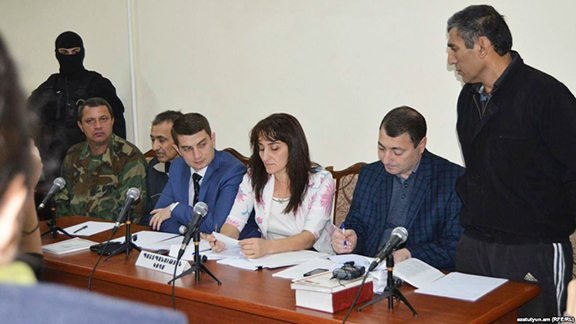STEPANAKERT (A.W.)—The Trial of two Azerbaijani saboteurs, Dilham Askerov and Shahbaz Guliyev, concluded on Dec. 29, with a life sentence for Askerov and 22 years in prison for Guliyev. The two were charged and convicted of not only illegally crossing the border into Karabagh but also the kidnapping and murder of 17-year-old Smbat Tsakanyan.

The two men were accompanied by a third intruder, Hasan Hasanov, as they crossed the border on June 29, armed with weapons and ammunition. Hasanov was later killed during a struggle with the Armenian Armed Forces as the soldiers attempted to capture the saboteurs.
The men were reportedly sent as spies by Baku to carry out espionage and to gather information. On July 4, they kidnapped Tsakanyan and later murdered him, leaving his body in a forest within the Shahumyan region. Tsakanyan’s father, Mekhak Tsakanyan, reported his son missing on July 7 after searching the village for days. Smbat Tsakanyan’s body was found with multiple gunshot wounds present.
The three saboteurs then attacked and killed Sargis Abrahamyan and severely wounded Karine Davtyan on the Vardenis-Karvachar Highway on July 11. The Armenian Armed forces attempted to arrest the trio, but Hasanov resisted arrest and was neutralized while his co-conspirators were detained and tried.
The Azerbaijani government has denounced the trial, demanding the release of the two men. Baku claims the two men had a right to visit Karabagh, as they say it belongs to Azerbaijan.
“This so called court process conducted in Azerbaijan’s occupied territories has no legal basis, and the result claimed cannot have any legal weight,” Hikmet Hajiyev, spokesperson for the Azerbaijani Foreign Ministry was quoted as saying. “Dilgam Asgarov and Shahbaz Guliyev were taken hostage by the Armenian Armed Forces as they were visiting the graves of their parents in the territory of Azerbaijan, and Hasan Hasanov was killed mercilessly. Armenia is responsible for grossly violating the European Convention on Human Rights, international humanitarian law, the UN Convention against Torture and Other Cruel, Inhuman or Degrading Treatment or Punishment, and for taking civilians hostage, interrogating them through torture and forcing them to face illegal trial,” he said, adding that Azerbaijan would work through the OSCE to secure the release of the two men.


I say let the Azeris go back to Baku.
Put them on an Armenian helicopter in autopilot mode and direct it east across the contact line into Azerbaijan.
They murdered two innocent Armenians. Hang them.
One of the problems that I see is that these two criminals are going to consume Artsakh’s food and resources while jailed for such long terms, meaning they have inflicted double losses on the country.
I wonder if there would ever come a situation where the the two criminals would be used for any negotiation, but then that would not be right for the victims’ families either.
Capital punishment has been abolished in Armenia, I guess based on ‘modern’ or ‘European’ standards, however Artsakh does not yet need to conform to this law. So it makes me wonder if these two were executed it would have its advantages as well such as Artsakh no longer supporting their drainage on resources and also a strong message to other would-be terrorists from Azerbaijan. On the otehr hand I think this case also shows positive PR for the independence and viability of Artsakh, whereas in the case of capital punishment, it could be used against it in the so-called “negotiations”.